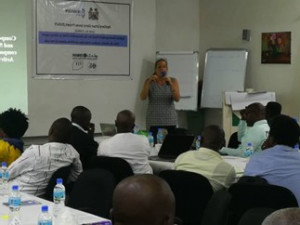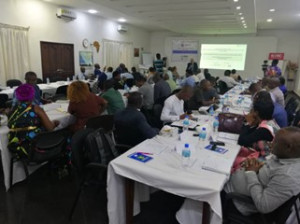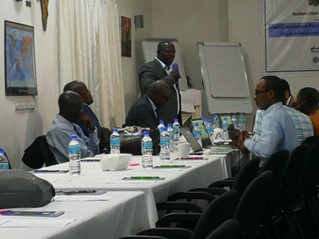By Milicent Seneva Mannah
In a bid to foster sustainable development in Sierra Leone, the Sierra Leone Urban Research Center (SLURC) recently spearheaded a pivotal one-day stakeholders’ meeting on February 27th, 2024. Held at Family Kingdom in Aberdeen, Freetown, the gathering focused on advancing Spatial Development Plans for six secondary cities within the nation. These cities include Bo, Bonthe, Kenema, Koidu New Sembehun, Makeni, and Port Loko.
Funded by the World Bank, the initiative is steered by the expertise of M/s Osmani & Company (Pvt.) Ltd (OCL), in conjunction with SLURC and IYER serving as sub-consultants. The primary objective of this collaborative endeavor is to establish a robust spatial information framework to aid the Government of Sierra Leone and Local Authorities in their endeavors to construct resilient and sustainable cities.
During the meeting, Dr. Spiro Pollalis of OCL underscored the adoption of a comprehensive multi-disciplinary approach. He said the approach seamlessly integrates technical engineering aspects alongside socio-cultural, economic, and environmental considerations. He emphasized the significance of leveraging expertise from similar assignments, robust local knowledge, and a positive reputation to drive the project’s success.
Echoing Dr. Pollalis’s sentiments, Sahr M. Kanawa, representing the Ministry of Lands, Housing, and Country Planning (MOLHCP), emphasized the project’s focal points. These include crafting tailored spatial development plans for the designated cities, which entail an array of activities such as data collection, stakeholder consultations, high-resolution imagery acquisition, climate change analysis, mapping, GIS database implementation, spatial development planning, capacity assessment, and capacity building.
The methodology for developing Spatial Development Plans for the six secondary cities in Sierra Leone, as outlined by the host, commences with an Inception Report. This report serves as a foundational document, identifying planning challenges, delineating planning areas, creating a detailed work plan, and adopting a methodology. Subsequently, stakeholder engagement is paramount, involving mapping, consultations, and documentation. Feasibility studies and policy prioritization are integral components contributing to the development process. Draft Structure Plans and Zoning Regulations undergo rigorous validation and peer review to ensure a participatory and adaptable strategy tailored to each municipality’s unique needs, were all outlined.


Through robust engagement with relevant stakeholders and the incorporation of a diverse range of perspectives, this project aims to fortify relationships, integrate local insights into Spatial Development plans, and propel sustainable urban development initiatives forward in Sierra Leone.
The commitment and collaboration demonstrated in this stakeholder meeting underscored a collective dedication to fostering resilient and sustainable urban landscapes, ensuring a brighter future for Sierra Leone’s secondary cities and their inhabitants.




